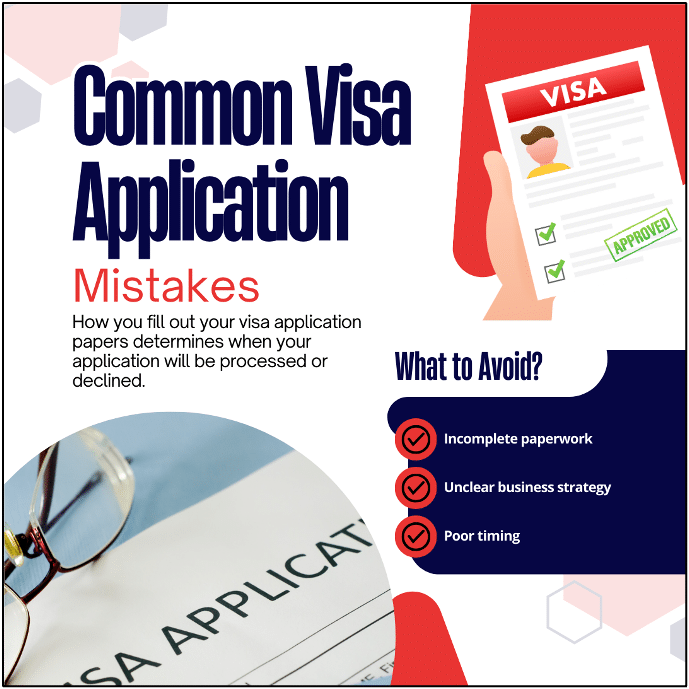Want to Take Your Business to the U.S.? Here’s How to Make It Happen – Legally and Smoothly
Expanding your business to the U.S. is a bold move—but the visa process can feel like a maze. You’re juggling growth plans, team logistics, and financial decisions, all while trying to decode immigration law.
Sound familiar? The good news: securing a U.S. work visa doesn’t have to be overwhelming. With the right strategy, business owners can secure a U.S. work visa smoothly and focus on growing their companies.
Understanding U.S. Work Visas for Business Owners
The U.S. has different work visas, and business owners must choose the right one. Some visas allow entrepreneurs to open new businesses, while others are for transferring employees. Knowing the difference is the first step in a smooth process.
The EB-5 visa is for investors who put a significant amount of money into the U.S. economy and create jobs. Unlike the E-2 visa, the EB-5 leads to a green card, but it requires a high investment and strict job creation rules.
The E-2 visa is for investors from treaty countries who want to start or buy a business in the U.S. Meanwhile, the l visa helps business owners transfer executives or key employees from a foreign office to a U.S. office. It is useful for companies expanding into the U.S. and can lead to permanent residency.
Choosing the wrong visa can lead to delays, denials, or missed opportunities. Taking the time to align your visa type with your business goals gives you a clearer path to U.S. market entry and long-term success.
Preparing Strong Documentation
It proves tough to obtain a work visa when showing authorities that your business operates successfully and exists in reality. US immigration officers verify complete paperwork to grant visa permits.
Financial records are essential. The owner needs to prove that the business already operates successfully and plans future growth. Documents like tax returns and bank statements show your company’s financial stability.
You need a comprehensive business plan to prove the business potential. The action plan needs to show findings from the market study alongside how it will hire employees and what growth targets the company has. The plan should demonstrate how the business adds value to the American economy.
Meeting Investment and Job Creation Requirements
Visa approvals depend heavily on how many jobs the investor creates and invests in American businesses. Every type of visa needs specific amounts of financial assets and investment funds.
The E-2 visa does not specify a set investment amount but demands that the investment be substantial enough to operate the business. A sufficient investment must exist to keep the business operational. True investments in real estate do not qualify for the program.
In most areas, EB-5 visa seekers need to invest at least $1.05 million but may put down $800,000 in targeted employment regions. A business owner should hire at least ten permanent United States workforce members as full-time employees.
Avoiding Common Visa Application Mistakes

How you fill out your visa application papers determines when your application will be processed or declined. Business owners need to watch for the most frequent errors in visa applications.
Incomplete or unready paperwork causes significant problems for reviewers. Lack of important financial documentation, unclear business strategies, or insufficient proof leads to visa denial by immigration officers. Every submission needs to show complete and easy-to-read documents that follow a neat structure.
Timing is also important. The L-1 visa needs proof of operational U.S. offices before granting permission. Some immigration programs, such as EB-5 take a very long period to process. Planning is crucial.
Working with Immigration Attorneys
The U.S. visa process is complex, and immigration laws change frequently. Hiring an immigration attorney can make the process smoother.
Attorneys help choose the right visa and ensure all paperwork is correct. They also prepare business owners for interviews with immigration officers. A good lawyer can identify potential issues before they become major problems.
For investors applying for EB-5 visas, attorneys work with financial experts to prove that the investment meets legal requirements. They also help with job creation plans.
For L-1 visas, lawyers assist in showing the proper relationship between the foreign and U.S. offices. They ensure all employee transfers meet immigration guidelines.
Understanding Visa Processing Times
Visa processing times vary based on the type of visa and the applicant’s country of origin. Some visas take only a few months, while others take years.
E-2 visas usually take two to four months to process, depending on the U.S. consulate handling the case.
L-1 visas can take one to six months, but premium processing is available for an extra fee. This speeds up the process to 15 days.
EB-5 visas have the longest wait time. Processing can take two to five years due to high demand and strict requirements.
Renewing and Maintaining U.S. Work Visas
Getting a visa is only the first step. Business owners must also follow renewal rules and maintain visa conditions.
E-2 visa holders must renew their visa every two to five years, depending on their country’s treaty with the U.S. The business must remain active, and the investment must still be at risk.
L-1 visas are granted for one to three years initially. Extensions are possible for up to seven years for executives and five years for specialized workers. The U.S. office must continue operations to qualify for renewal.
EB-5 visa holders receive a conditional green card for two years. To remove conditions, they must prove that their investment created jobs as required.
Exploring Alternative Visa Options
If a business owner does not qualify for a specific visa, other options may be available.
The O-1 visa is for individuals with extraordinary ability in business, science, or other fields. Business owners with significant achievements may qualify.
The H-1B visa allows companies to sponsor skilled foreign workers. While it is mainly for employees, some business owners may use it if they meet the requirements.
Family-based green cards can also be an option. If a business owner has a U.S. citizen spouse or close relative, they may qualify for permanent residency.
Conclusion
Securing a U.S. work visa can be challenging, but the right preparation makes it easier. Choosing the right visa, preparing strong documentation, and meeting investment requirements are key steps. Avoiding mistakes and working with an immigration attorney improves the chances of approval.
Visa processing takes time, and renewals require ongoing compliance. Business owners should plan and explore all possible visa options.
With careful planning and the right support, entrepreneurs can successfully expand their businesses to the U.S. and achieve long-term success.
FAQs
1. Can I apply for a U.S. work visa while still running my business in another country?
Yes, many business visas, like the L-1 visa, allow owners to manage both a U.S. office and a foreign office at the same time. However, you must show that both businesses are actively operating.
2. What happens if my visa application is denied?
If your application is denied, you can appeal the decision or reapply with stronger documentation. It’s best to work with an immigration attorney to identify and fix any issues.
3. Do I need to speak English fluently to qualify for a business visa?
While fluency is not required, you may need to communicate effectively in business and legal matters. Some visas, like the E-2, may require a business plan, which should be clear and well-prepared.

